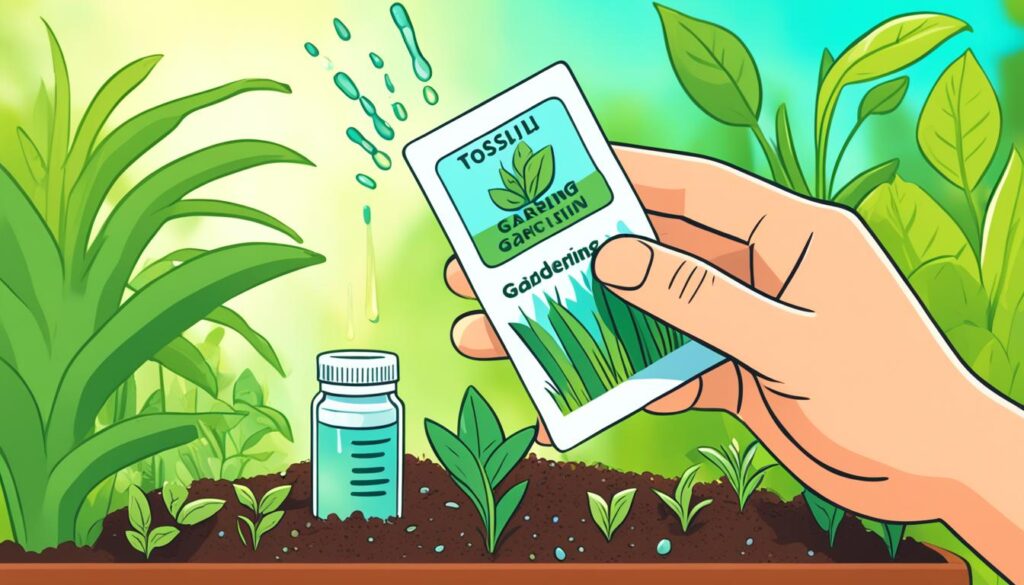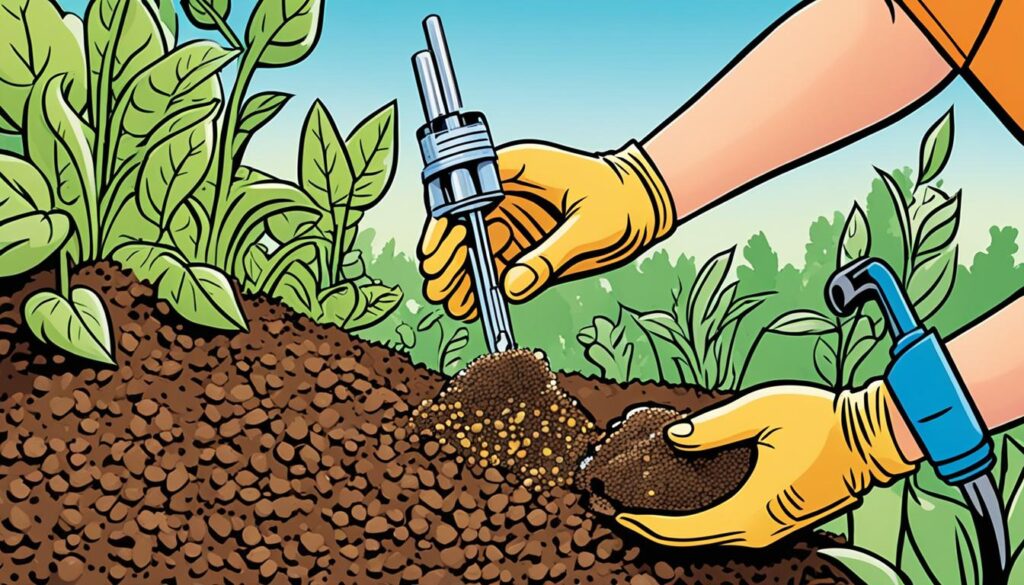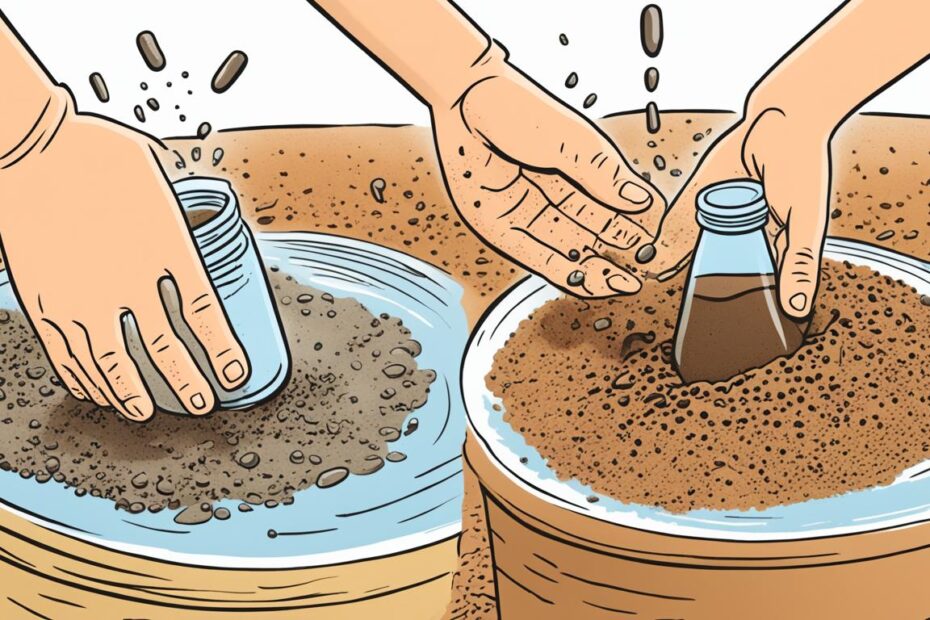Have you ever wondered why some plants thrive while others struggle in your garden? Is there a secret ingredient that you’re missing, preventing your garden from reaching its full potential? If you want to uncover the key to successful gardening and unleash the hidden potential of your garden, the answer lies beneath your feet. It’s time to unlock your garden’s potential by performing a soil test at home.
- Performing a soil test at home allows you to optimize nutrient levels and adjust pH balance.
- Soil testing helps prevent nutrient imbalances and assess soil health.
- Understanding your soil’s composition through regular testing helps you make informed decisions about fertilization and amendments.
- By unlocking your garden’s potential through soil testing, you can create an optimal environment for healthier plants and bountiful harvests.
- Stay tuned to learn how to perform a soil test at home and discover the benefits it brings to your garden.
Takeaways>
The Benefits of Nutrient Optimization
Soil nutrient testing is a critical step in optimizing the health and productivity of your garden. By understanding the existing nutrient levels in your soil, you can make informed decisions about fertilizer application, preventing wastage and promoting nutrient balance.
When you conduct soil nutrient testing, you gain valuable insights into which nutrients may be lacking or excessive in your soil. This knowledge empowers you to tailor your fertilizer application to meet the specific needs of your plants, ensuring they receive the essential nutrients they require for optimal growth and development.
By optimizing nutrient levels through targeted fertilizer application, you not only promote healthier plant growth but also increase productivity. Plants that have access to the right balance of nutrients are more resistant to diseases and pests, produce higher yields, and exhibit improved overall vigor.
To help you visualize the benefits of nutrient optimization, here’s a table summarizing the impact of soil nutrient testing and tailored fertilizer application:
| Benefits of Nutrient Optimization |
|---|
| Enhanced plant growth and development |
| Improved nutrient availability for plants |
| Increased disease and pest resistance |
| Higher crop yields |
| Enhanced overall plant vigor |
By optimizing nutrient levels in your soil through soil nutrient testing and targeted fertilizer application, you can create an environment that supports thriving plants and maximizes the potential of your garden.
The Importance of pH Adjustment
Proper pH levels are crucial for plant success. Soil testing allows you to assess the acidity or alkalinity of your soil, which affects nutrient availability. Most plants prefer slightly acidic soil, with a pH level between 6 and 7. Adjusting pH balance through soil amendments helps improve nutrient uptake and overall plant health.
Adding materials like lime or wood ash can raise pH for acidic soil, while organic matter like compost or peat moss can lower pH for alkaline soil. By optimizing the pH balance of your soil, you create an ideal environment for plant growth, ensuring they receive the necessary nutrients for their development and productivity.
Benefits of pH Adjustment:
- Enhances nutrient availability: Adjusting pH levels ensures that essential nutrients are readily available for plant uptake, preventing nutrient deficiencies and promoting healthy growth.
- Improves microbial activity: The right pH range supports beneficial microbial activity in the soil, facilitating nutrient cycling and root development.
- Optimizes chemical reactions: pH adjustment creates an environment where chemical reactions necessary for nutrient absorption and utilization occur optimally.
- Prevents nutrient imbalances: Balanced pH levels help prevent excesses or deficiencies of specific nutrients, reducing the risk of nutrient imbalances that can harm plant health.
Soil pH Scale:
| pH Level | Soil Acidity/Alkalinity |
|---|---|
| Less than 6 | Acidic |
| 6 – 7 | Slightly acidic to neutral |
| 7 | Neutral |
| Greater than 7 | Alkaline |

“Proper pH adjustment is like fine-tuning the orchestra for an enchanting symphony of plant growth and bountiful harvests.”
Preventing Nutrient Imbalances
Nutrient imbalances can impede the growth and productivity of your plants and crops. To ensure optimal plant health, it is essential to identify any deficiencies or excesses in soil nutrient levels. Regular soil testing is a key practice that empowers you to make informed decisions about fertilizers and amendments, promoting a balanced nutrient profile for healthier plants.
One effective strategy for preventing nutrient imbalances is practicing crop rotation. By strategically rotating crops within your garden, you can mitigate the risk of nutrient depletion caused by particular plants. Each crop has different nutrient requirements and impacts the soil differently. Rotation allows you to distribute the demand for specific nutrients, minimizing the risk of imbalances. This sustainable technique fosters the overall health of your soil and cultivates more robust and thriving plants.
“Crop rotation is like a dance for your plants, ensuring a harmonious and well-balanced nutrient symphony.”
Implementing a crop rotation plan involves carefully selecting a sequence of plants that complement each other and promote soil health. For example, legumes have the ability to fix nitrogen, enriching the soil for subsequent crops. Leafy greens and brassicas, like kale and broccoli, are heavy feeders that benefit from the increased nutrient availability left behind by leguminous plants.
A well-designed crop rotation plan not only prevents nutrient imbalances but also minimizes the risk of pest and disease buildup. Certain pests and diseases are specific to particular plant families, and by rotating crops, you disrupt their life cycles and reduce their impact, further safeguarding the health of your garden.
The Benefits of Crop Rotation:
- Promotes a balanced nutrient profile by distributing nutrient demands
- Reduces the risk of nutrient imbalances and deficiencies
- Enhances soil health and fertility
- Minimizes the occurrence of pests and diseases
- Improves overall plant growth and crop yields
By combining regular soil testing with a well-planned crop rotation strategy, you can cultivate a flourishing garden and achieve a balanced nutrient profile, ultimately reaping the rewards of healthier, more bountiful harvests.
| Nutrient | Deficiency Symptoms | Excess Symptoms |
|---|---|---|
| Nitrogen (N) | Stunted growth, yellowing leaves | Excessive foliage growth, reduced fruiting |
| Phosphorus (P) | Poor root development, purple leaves | Stunted growth, nutrient imbalances |
| Potassium (K) | Weak stems, yellowing leaf edges | Excessive salt buildup, reduced water uptake |
| Calcium (Ca) | Tip burn on leaves, blossom end rot | Impaired nutrient absorption, imbalances |
Assessing Soil Health
Soil health assessment plays a crucial role in understanding the condition and fertility of your soil. By evaluating both the physical properties and chemical analysis, you can gain valuable insights into the overall health of your soil.
The physical properties of the soil, such as texture, structure, and compaction, have a direct impact on water retention and root growth. Understanding these properties allows you to make informed decisions about irrigation, drainage, and soil amendments. For example, sandy soils drain quickly but hold less water, while clay soils retain more water but drain slowly. The structure of the soil affects root penetration and provides channels for airflow and water movement.
Chemical analysis is essential for assessing the nutrient content of your soil. Testing for essential nutrients like nitrogen, phosphorus, and potassium (NPK), as well as micronutrients like iron, zinc, and magnesium, provides a comprehensive understanding of your soil’s nutrient profile. This information allows you to identify any imbalances and make informed decisions about fertilization and amendments. Maintaining a balanced nutrient profile is vital for optimal plant growth and productivity.
Regular soil testing is key to promoting overall soil health. It enables you to monitor and manage any potential issues before they impact plant growth and productivity. By constantly assessing the physical properties and chemical analysis of your soil, you can make necessary adjustments to create an optimal environment for your plants.

Proactive soil management leads to thriving gardens
“Understanding the condition of your soil is the foundation for successful gardening. By regularly assessing the physical properties and chemical analysis, you can make informed decisions about soil amendments, irrigation, and fertilization. This proactive approach to soil management ensures your garden thrives and yields bountiful harvests.”
Choosing the Right Soil Test Kit
When it comes to performing a DIY soil test at home, you have several options to choose from. Various soil test kits are available in the market, offering accurate and reliable results without the need for expensive professional testing services.
One popular choice is the pH test kit. These kits allow you to measure the acidity or alkalinity of your soil, which is essential for proper nutrient uptake. pH plays a significant role in determining the availability of nutrients to your plants. By monitoring and adjusting the pH balance, you can optimize nutrient absorption and ensure healthy plant growth.
If you’re looking for a more advanced option, consider a digital pH meter. These meters provide instant and precise pH readings, eliminating the guesswork. They are easy to use and offer a convenient way to monitor pH levels in your soil over time, allowing you to make informed decisions regarding pH adjustments.
Additionally, you may want to consider kits that offer nutrient testing. These kits provide insights into the nutrient levels in your soil, including essential macronutrients like nitrogen (N), phosphorus (P), and potassium (K). Knowing the nutrient content of your soil allows you to customize your fertilizer application, preventing under or over-fertilization and promoting optimal plant growth.
Remember, choosing the right soil test kit is crucial for accurate results and informed decision-making. So take the time to research and select a kit that suits your specific needs and gardening goals.
Soil Test Product Review: Luster Leaf 1601 Rapitest® Soil Test Kit
If you’re a home gardener looking for a reliable and comprehensive soil test kit, look no further than the Luster Leaf 1601 Rapitest® Soil Test Kit. This popular kit is designed to provide accurate and easy-to-interpret results for pH testing, nutrient testing, and soil analysis.
The Luster Leaf 1601 Rapitest® Soil Test Kit includes all the components you need to perform 40 tests, ensuring you have ample supply for ongoing testing and analysis. With 10 tests each for pH, nitrogen (N), phosphorus (P), and potassium (K), this kit allows you to assess key aspects of your soil’s health and fertility.
One of the standout features of this soil test kit is its patented color comparator system. This system simplifies the process of comparing color-coded test results with the included color chart, enabling you to obtain accurate readings without any guesswork. The clear and intuitive design of the color comparator system makes it suitable for both beginners and experienced gardeners.
Additionally, the Luster Leaf 1601 Rapitest® Soil Test Kit provides over 400 plant recommendations, offering invaluable guidance when it comes to soil amendments. This extensive plant database helps you tailor your soil treatment plan according to the specific needs of your plants, ensuring optimal growth and productivity.
While using the Luster Leaf 1601 Rapitest® Soil Test Kit does require some time and patience, it offers accurate and reliable test results. By utilizing this kit, you can gain insights into your soil’s pH levels, nutrient content, and overall composition, empowering you to make informed decisions about fertilization, amendments, and plant care practices.
Investing in the Luster Leaf 1601 Rapitest® Soil Test Kit is a wise choice for any home gardener who is serious about optimizing their soil health and promoting vibrant plant growth. Unlock the full potential of your garden with this user-friendly and effective soil test kit.
Conclusion
Unlock the full potential of your garden by performing soil tests at home. Not only does this simple practice optimize nutrient levels and adjust pH balance, but it also prevents nutrient imbalances and promotes overall soil health. By understanding your soil’s composition through regular testing, you can make informed decisions about fertilization, amendments, and plant care practices, creating an optimal environment for healthier plants and bountiful harvests.
Soil testing is a vital step towards maximizing the productivity and success of your garden. By identifying any nutrient deficiencies or excesses, you can tailor your fertilization approach, reducing wastage and minimizing potential harm caused by over-fertilizing. Adjusting pH balance according to your crop’s preferences ensures optimal nutrient uptake and thriving plants.
Additionally, soil testing helps prevent nutrient imbalances that can hinder plant growth. By practicing crop rotation and using the information gained from soil tests, you can maintain a balanced nutrient profile and ensure that your plants receive all the essential elements they need for healthy development.
Investing time and effort into soil testing empowers you to assess the health and fertility of your soil accurately. Whether you choose a DIY soil test kit or opt for professional services, evaluating physical properties and conducting chemical analysis helps you understand your soil’s needs better. Armed with this knowledge, you can make educated decisions to support overall soil health, leading to stronger, more resilient plants and a thriving garden.
FAQ
Why is soil testing important for gardening?
Soil testing is crucial for successful gardening as it allows you to optimize nutrient levels, adjust pH balance, prevent nutrient imbalances, and assess soil health.
How does soil testing help with fertilization?
By understanding the existing nutrient levels in your soil through soil testing, you can make informed decisions about fertilization, preventing wastage and potential harm caused by over-fertilizing.
What is the importance of pH adjustment in soil?
pH balance in soil is crucial for plant success as it affects nutrient availability. Soil testing allows you to assess the acidity or alkalinity of your soil and adjust pH balance through amendments, improving nutrient uptake and overall plant health.
How does soil testing help prevent nutrient imbalances?
Regular soil testing helps identify deficiencies and excesses in nutrient levels, enabling you to make informed decisions about fertilizers or amendments to use. Practicing crop rotation also helps prevent nutrient depletion caused by certain plants, ensuring a balanced nutrient profile and healthier plants.
What does soil health assessment involve?
Soil health assessment involves evaluating various factors such as physical properties (texture, structure, compaction), chemical analysis (essential nutrients, micronutrients), and overall fertility to promote optimal plant growth.
How can I perform a soil test at home?
You can choose from various soil test kits available, including pH test kits, digital pH meters, and kits that measure nutrient levels. These user-friendly kits provide accurate and reliable results without the need for professional testing services.
What is a recommended soil test kit?
The Luster Leaf 1601 Rapitest® Soil Test Kit is a popular choice for home gardeners. It includes components for performing 40 tests and provides easy color comparisons for accurate results. The kit also includes over 400 plant recommendations to guide soil amendments.
Why should I perform a soil test at home?
Performing a soil test at home is essential for unlocking your garden’s potential. It optimizes nutrient levels, adjusts pH balance, prevents nutrient imbalances, and promotes overall soil health, resulting in healthier plants and bountiful harvests.
